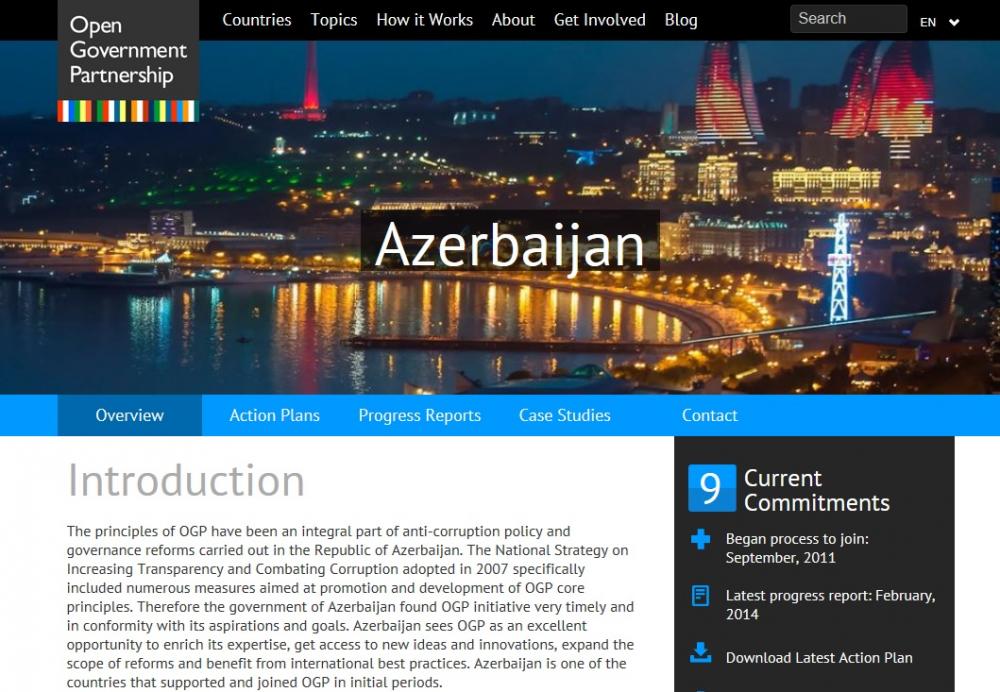
Casting Shadows: An Illuminating Report on Azerbaijan's Struggle for Open Government
The Open Government Partnership (OGP) operates in 64 countries to help government and civil society organizations (CSOs) work toward ambitious open government reforms. Since joining the partnership in 2012, Azerbaijan, an oil-rich country on the Caspian Sea, has pushed for extractive sector transparency, fiscal transparency, and more in its OGP action plan. But in its first two years it completed just six of its 37 commitments, according to a 105-page report published by the country's independent reporting mechanism (IRM), an OGP tool to promote accountability between member governments and citizens.

Azerbaijan is one of 64 countries that have joined OGP since 2011.
Beyond the IRM and a government self-assessment, an essential component of OGP work in any country is the development of so-called shadow reports, which help identify gaps in the implementation process and measure progress. In 2013, the Natural Resource Governance Institute (then the Revenue Watch Institute - Natural Resource Charter) funded a project that monitors OGP implementation in four sub-national regions. The result was a 14-page civil society monitoring report identifying critical gaps in civic engagement and access to information at the sub-national level, where many of Azerbaijan's commitments lie.
"Civil society monitoring reports—or ‘shadow reports'—are really important, as they serve as an extra advocacy tool for civil society in their in-country work on OGP," said Paul Maassen, civil society coordinator for the Open Government Partnership. Speaking to Azerbaijani stakeholders earlier this year, he said, "You can use it as an extra tool to push for real government commitment to OGP in your country. You can lobby your government, for example, to integrate the findings of your CSO or IRM report into the new action plan." [Read the full interview here.]
Last month the global partnership held regional meetings in Asia Pacific and Europe, where OGP members updated their action plans, discussed challenges and shared lessons learned. A member of the international EITI Board and a senior researcher at the Baku-based Economic Research Center in Azerbaijan, Gubad Ibadoglu wrote the country's shadow report and coordinates its EITI NGO coalition. He shared his findings alongside Kenan Aslanli, the researcher who produced the OGP independent progress report—but a key audience segment may have missed their message.
"Specific to the OGP process, we've seen delays with the government's self-reporting, which I discussed in Dublin," Ibadoglu said. "Unfortunately Azerbaijan's official delegation did not join that meeting."
While Maassen points out that shadow reports help shape the OGP agenda, they lack official status within the OGP structure and mechanism. Still, Ibadoglu says they can help illuminate other obstacles on the path toward transparency, such as government bureaucracy. For example, CSOs in Azerbaijan must register, translate, sign and notarize grants before bank transfers can be made, he says. They must also obtain permission from the president's administration to rent space from most hotels and business centers in Baku.
"The most serious problem in terms of fiscal transparency is the absence of open data," Ibadoglu adds, drawing on years of monetary policy research and on his experience monitoring Azerbaijan's fiscal transparency commitments. "Data should be open at both the local and national level, but most budgetary information is closed, and public participation in the budget process is low. I would recommend that our government make stronger commitments to assets disclosure in order to expand access to information and to crack down on corruption in the country."
To read the full list of recommendations, or to access other shadow reports, visit the OGP Civil Society Hub and scroll down to find all 13 civil society monitoring reports, including two from Azerbaijan. To learn more about OGP in Azerbaijan, visit the OGP website here.
Fidan Bagirova is NRGI's Senior Regional Associate. Bremen Leak is NRGI's communications officer based in New York.
Authors

Fidan Bagirova
Eurasia Senior Officer
